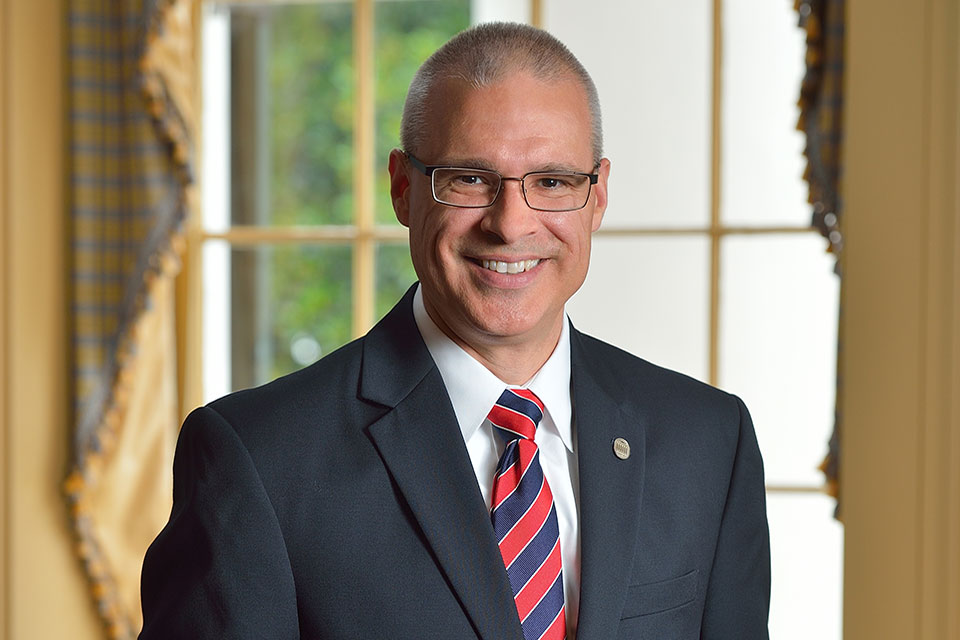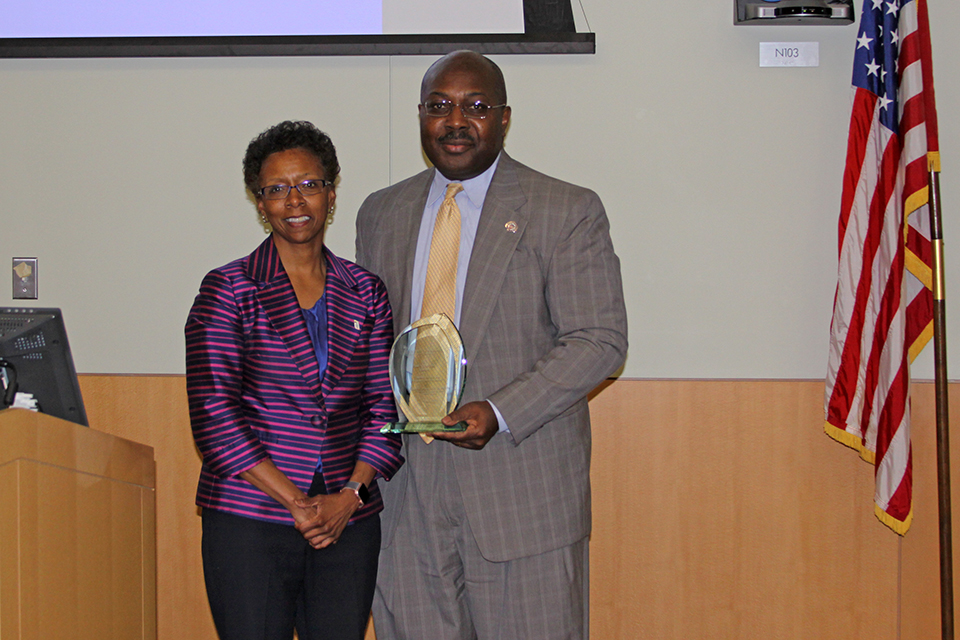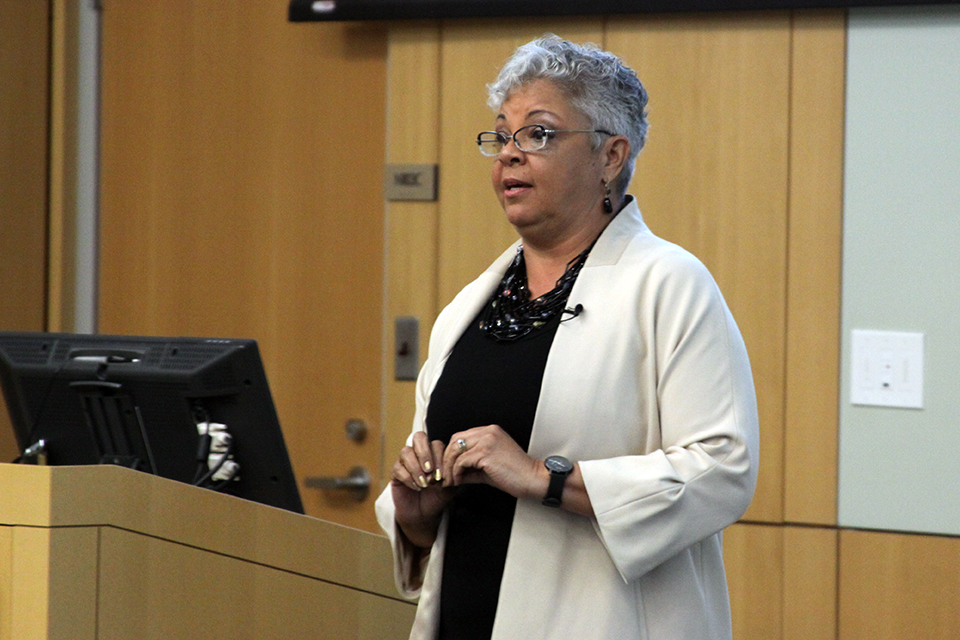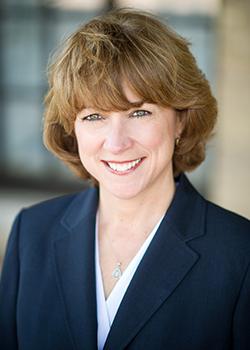SOP’s Annual Pumpian Lecture Explores Meaning in the Pharmacy Profession
Alumnus Dr. Noel E. Wilkin discusses how professional satisfaction – not profitability – drives entrepreneurship and innovation among pharmacists.

By Malissa Carroll
June 7, 2018
Chasing innovation – being an entrepreneur – is not an easy task, especially when creative or financial resources are limited. So, why would an individual willingly choose to pursue such a difficult endeavor?
This was the question that Noel E. Wilkin, RPh, BSP ’89, PhD ’97, provost and executive vice chancellor for academic affairs and professor of pharmacy administration at the University of Mississippi, sought to answer as he delivered the annual Paul A. Pumpian Memorial Lecture at the University of Maryland School of Pharmacy on April 11.
Titled “Innovation and Meaning: The Building Blocks of Entrepreneurship and Professional Satisfaction,” Wilkin’s lecture focused on a grant that he received from the National Community Pharmacists Association (NCPA), which aimed to encourage pharmacists to implement more innovative approaches in their practices by demonstrating how profitable such innovations could be for the pharmacy.
However, Wilkin was quick to explain that the results of his research did not quite match his funders’ original hypothesis.
“NCPA was convinced that pharmacies would innovate if we could demonstrate how profitable it was for pharmacists,” said Wilkin, who also serves as a research professor for the Research Institute of Pharmaceutical Sciences at the University of Mississippi. “But, our team quickly recognized that there was no profitability source. We had 300 pharmacists coming to a sponsored breakfast to learn about how to innovate and how to be profitable, and we had nothing to tell them. We were panicking.”
Wilkin and his team conducted interviews at 14 pharmacies across the country to learn about the factors that motivated those pharmacists to innovate in their practices. Although none of the pharmacists reported increased profits as a motivator or result of incorporating their innovations into their practice, they explained that their innovations left them feeling a high level of personal and professional satisfaction. One pharmacist that Wilkin interviewed even described his motivation to rearrange his practice by saying, “My lawn service calls me before I need my lawn serviced, why can’t my pharmacist call and talk to me about my medications before I need my prescriptions refilled?”
Although Wilkin appreciated the honesty with which the pharmacists responded to his questions, he struggled to frame the results in a way that would encourage other pharmacists to pursue innovation in their own practices. It was an episode of The Daily Show with Jon Stewart that led Wilkin to his greatest epiphany surrounding the reasons that pharmacists might still choose to pursue innovation even in the face of constrained resources.
“I’m lying awake thinking about this problem, and Jon Stewart began interviewing a man named Tal Ben-Shahar, a faculty member at Harvard who had just written a book titled Happier,” recalled Wilkin. “And, as I laid there listening to him talk about people who are pursuing meaning in their lives and how it made them happier, it clicked. Pharmacists were not innovating because they were motivated by money. They were not innovating because the pharmacy profession told them it was what they ought to do. Instead, they were doing it because it made them happy.”
Wilkin then further examined personal motivators, such as identity and purpose, as potential drivers behind pharmacists’ desire to innovate in their practices.
“We know that identity drives actions,” he said. “Our purpose is manifested in our roles; it gives us a sense of direction. Accepting the role of being health care professionals affects our actions and it outlines our purpose. It is our reason for being, and success in this role is then knowing our purpose, growing to reach our potential, and sowing those seeds to help others.”
He also explored the concept of “meaning,” noting that if pharmacists have accepted their role as health care professionals, pharmacies can further energize their performance by ensuring that the activities in which they are engaged relate to their purpose and have significant value or an impact on others – or, in other words, are meaningful.
“Meaning is self-generated,” said Wilkin. “It’s based on your experiences and linked to the circumstances that you accept in your life and that define your purpose. It’s also linked to, I believe, happiness. It’s the pursuit of meaning on an everyday basis and on a long-term basis that helps you to appreciate and understand happiness.”
Wilkin argued that happiness is not a dichotomy in which a person either is or is not happy at a given time, as many people believe. Instead, he posited that all individuals, including pharmacists, can achieve sustained happiness by engaging in activities that offer both an immediate, present benefit as well as goals that they can strive to achieve in the future (or future benefit). “If you get in touch with what you believe is your meaning and it brings you present benefit and future benefit, then it’s going to result in greater happiness and, ultimately, it will help you find direction as you engage in activities that are connected to your roles in society,” he said.
To conclude his lecture, Wilkin revisited the pharmacists that he interviewed during his NCPA-funded study.
“Pharmacists have incredible opportunities to find purpose and meaning in their work,” he said. “For the pharmacists that we interviewed, the purpose and meaning that they found wasn’t a function of profitability; it wasn’t a function of them making more money. Instead, it was a function of them finding incredible meaning in their life – taking daily pleasure in their work and the benefit they found in interacting with patients on a day-to-day basis, while also keeping sight of their overall goal and drive to improve the health of their patients.”



